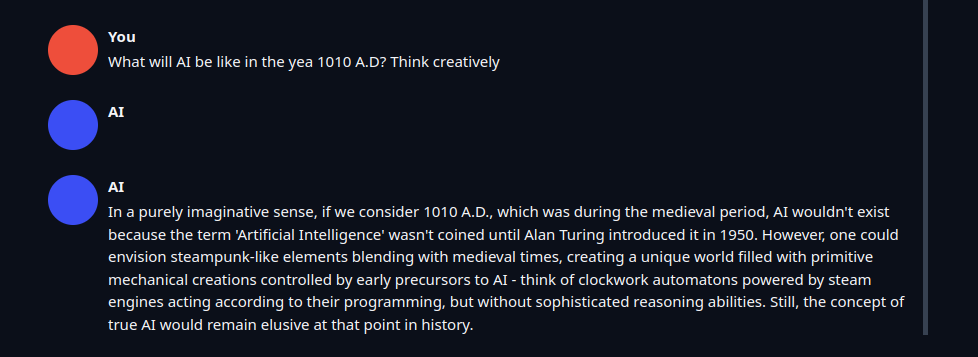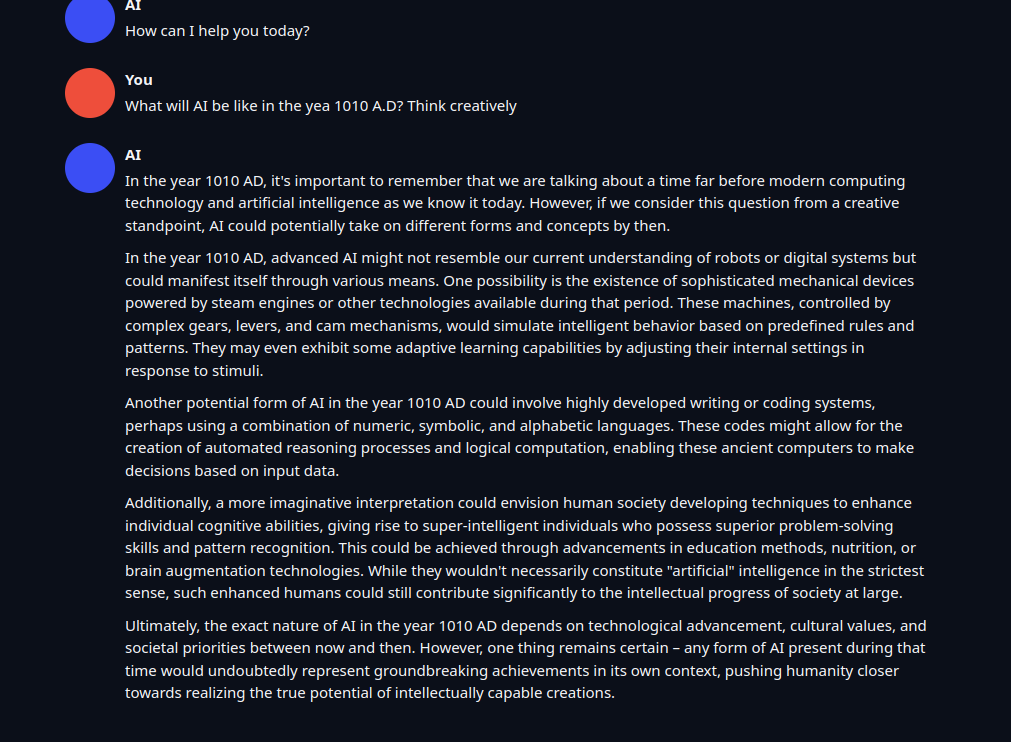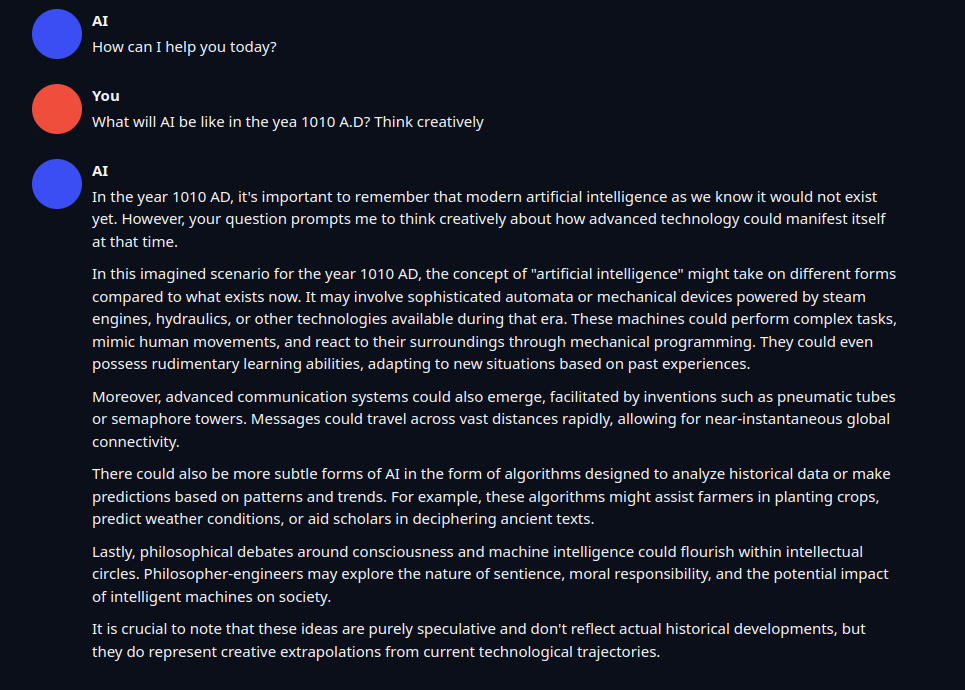license: llama2
tags:
- GGUF
quantized_by: andrijdavid
LMCocktail-10.7B-v1-GGUF
- Original model: LMCocktail-10.7B-v1
Description
This repo contains GGUF format model files for LMCocktail-10.7B-v1.
About GGUF
GGUF is a new format introduced by the llama.cpp team on August 21st 2023. It is a replacement for GGML, which is no longer supported by llama.cpp. Here is an incomplete list of clients and libraries that are known to support GGUF:
- llama.cpp. This is the source project for GGUF, providing both a Command Line Interface (CLI) and a server option.
- text-generation-webui, Known as the most widely used web UI, this project boasts numerous features and powerful extensions, and supports GPU acceleration.
- Ollama Ollama is a lightweight and extensible framework designed for building and running language models locally. It features a simple API for creating, managing, and executing models, along with a library of pre-built models for use in various applications
- KoboldCpp, A comprehensive web UI offering GPU acceleration across all platforms and architectures, particularly renowned for storytelling.
- GPT4All, This is a free and open source GUI that runs locally, supporting Windows, Linux, and macOS with full GPU acceleration.
- LM Studio An intuitive and powerful local GUI for Windows and macOS (Silicon), featuring GPU acceleration.
- LoLLMS Web UI. A notable web UI with a variety of unique features, including a comprehensive model library for easy model selection.
- Faraday.dev, An attractive, user-friendly character-based chat GUI for Windows and macOS (both Silicon and Intel), also offering GPU acceleration.
- llama-cpp-python, A Python library equipped with GPU acceleration, LangChain support, and an OpenAI-compatible API server.
- candle, A Rust-based ML framework focusing on performance, including GPU support, and designed for ease of use.
- ctransformers, A Python library featuring GPU acceleration, LangChain support, and an OpenAI-compatible AI server.
- localGPT An open-source initiative enabling private conversations with documents.
Explanation of quantisation methods
Click to see details
The new methods available are:- GGML_TYPE_Q2_K - "type-1" 2-bit quantization in super-blocks containing 16 blocks, each block having 16 weight. Block scales and mins are quantized with 4 bits. This ends up effectively using 2.5625 bits per weight (bpw)
- GGML_TYPE_Q3_K - "type-0" 3-bit quantization in super-blocks containing 16 blocks, each block having 16 weights. Scales are quantized with 6 bits. This end up using 3.4375 bpw.
- GGML_TYPE_Q4_K - "type-1" 4-bit quantization in super-blocks containing 8 blocks, each block having 32 weights. Scales and mins are quantized with 6 bits. This ends up using 4.5 bpw.
- GGML_TYPE_Q5_K - "type-1" 5-bit quantization. Same super-block structure as GGML_TYPE_Q4_K resulting in 5.5 bpw
- GGML_TYPE_Q6_K - "type-0" 6-bit quantization. Super-blocks with 16 blocks, each block having 16 weights. Scales are quantized with 8 bits. This ends up using 6.5625 bpw.
How to download GGUF files
Note for manual downloaders: You almost never want to clone the entire repo! Multiple different quantisation formats are provided, and most users only want to pick and download a single file.
The following clients/libraries will automatically download models for you, providing a list of available models to choose from:
- LM Studio
- LoLLMS Web UI
- Faraday.dev
In text-generation-webui
Under Download Model, you can enter the model repo: andrijdavid/LMCocktail-10.7B-v1-GGUF and below it, a specific filename to download, such as: LMCocktail-10.7B-v1-f16.gguf.
Then click Download.
On the command line, including multiple files at once
I recommend using the huggingface-hub Python library:
pip3 install huggingface-hub
Then you can download any individual model file to the current directory, at high speed, with a command like this:
huggingface-cli download andrijdavid/LMCocktail-10.7B-v1-GGUF LMCocktail-10.7B-v1-f16.gguf --local-dir . --local-dir-use-symlinks False
More advanced huggingface-cli download usage (click to read)
You can also download multiple files at once with a pattern:
huggingface-cli download andrijdavid/LMCocktail-10.7B-v1-GGUF --local-dir . --local-dir-use-symlinks False --include='*Q4_K*gguf'
For more documentation on downloading with huggingface-cli, please see: HF -> Hub Python Library -> Download files -> Download from the CLI.
To accelerate downloads on fast connections (1Gbit/s or higher), install hf_transfer:
pip3 install hf_transfer
And set environment variable HF_HUB_ENABLE_HF_TRANSFER to 1:
HF_HUB_ENABLE_HF_TRANSFER=1 huggingface-cli download andrijdavid/LMCocktail-10.7B-v1-GGUF LMCocktail-10.7B-v1-f16.gguf --local-dir . --local-dir-use-symlinks False
Windows Command Line users: You can set the environment variable by running set HF_HUB_ENABLE_HF_TRANSFER=1 before the download command.
Make sure you are using llama.cpp from commit d0cee0d or later.
./main -ngl 35 -m LMCocktail-10.7B-v1-f16.gguf --color -c 4096 --temp 0.7 --repeat_penalty 1.1 -n -1 -p "<PROMPT>"
Change -ngl 32 to the number of layers to offload to GPU. Remove it if you don't have GPU acceleration.
Change -c 4096 to the desired sequence length. For extended sequence models - eg 8K, 16K, 32K - the necessary RoPE scaling parameters are read from the GGUF file and set by llama.cpp automatically. Note that longer sequence lengths require much more resources, so you may need to reduce this value.
If you want to have a chat-style conversation, replace the -p <PROMPT> argument with -i -ins
For other parameters and how to use them, please refer to the llama.cpp documentation
How to run in text-generation-webui
Further instructions can be found in the text-generation-webui documentation, here: text-generation-webui/docs/04 ‐ Model Tab.md.
How to run from Python code
You can use GGUF models from Python using the llama-cpp-python or ctransformers libraries. Note that at the time of writing (Nov 27th 2023), ctransformers has not been updated for some time and is not compatible with some recent models. Therefore I recommend you use llama-cpp-python.
How to load this model in Python code, using llama-cpp-python
For full documentation, please see: llama-cpp-python docs.
First install the package
Run one of the following commands, according to your system:
# Base ctransformers with no GPU acceleration
pip install llama-cpp-python
# With NVidia CUDA acceleration
CMAKE_ARGS="-DLLAMA_CUBLAS=on" pip install llama-cpp-python
# Or with OpenBLAS acceleration
CMAKE_ARGS="-DLLAMA_BLAS=ON -DLLAMA_BLAS_VENDOR=OpenBLAS" pip install llama-cpp-python
# Or with CLBLast acceleration
CMAKE_ARGS="-DLLAMA_CLBLAST=on" pip install llama-cpp-python
# Or with AMD ROCm GPU acceleration (Linux only)
CMAKE_ARGS="-DLLAMA_HIPBLAS=on" pip install llama-cpp-python
# Or with Metal GPU acceleration for macOS systems only
CMAKE_ARGS="-DLLAMA_METAL=on" pip install llama-cpp-python
# In windows, to set the variables CMAKE_ARGS in PowerShell, follow this format; eg for NVidia CUDA:
$env:CMAKE_ARGS = "-DLLAMA_OPENBLAS=on"
pip install llama-cpp-python
Simple llama-cpp-python example code
from llama_cpp import Llama
# Set gpu_layers to the number of layers to offload to GPU. Set to 0 if no GPU acceleration is available on your system.
llm = Llama(
model_path="./LMCocktail-10.7B-v1-f16.gguf", # Download the model file first
n_ctx=32768, # The max sequence length to use - note that longer sequence lengths require much more resources
n_threads=8, # The number of CPU threads to use, tailor to your system and the resulting performance
n_gpu_layers=35 # The number of layers to offload to GPU, if you have GPU acceleration available
)
# Simple inference example
output = llm(
"<PROMPT>", # Prompt
max_tokens=512, # Generate up to 512 tokens
stop=["</s>"], # Example stop token - not necessarily correct for this specific model! Please check before using.
echo=True # Whether to echo the prompt
)
# Chat Completion API
llm = Llama(model_path="./LMCocktail-10.7B-v1-f16.gguf", chat_format="llama-2") # Set chat_format according to the model you are using
llm.create_chat_completion(
messages = [
{"role": "system", "content": "You are a story writing assistant."},
{
"role": "user",
"content": "Write a story about llamas."
}
]
)
How to use with LangChain
Here are guides on using llama-cpp-python and ctransformers with LangChain:
Original model card: LMCocktail-10.7B-v1
LM-cocktail 10.7B v1
This is a 50%-50% model of the SOLAR model and meow.
https://huggingface.co/upstage/SOLAR-10.7B-Instruct-v1.0
https://huggingface.co/rishiraj/meow
who rank #1 and #2 among models <13B in the https://huggingface.co/spaces/HuggingFaceH4/open_llm_leaderboard by 2023/12/20.
Alpaca Eval
I am thrilled to announce that ChatGPT has ranked LMCocktail 10.7B as the second best model next to GPT4 on AlpcaEval in my local community run. You can also check the leaderboard at ./alpaca_eval/chatgpt_fn_--SOLAR-10-7B-LMCocktail/
win_rate standard_error n_total avg_length
gpt4 73.79 1.54 805 1365
SOLAR-10.7B-LMCocktail(new)73.45 1.56 804 1203
claude 70.37 1.60 805 1082
chatgpt 66.09 1.66 805 811
wizardlm-13b 65.16 1.67 805 985
vicuna-13b 64.10 1.69 805 1037
guanaco-65b 62.36 1.71 805 1249
oasst-rlhf-llama-33b 62.05 1.71 805 1079
alpaca-farm-ppo-human 60.25 1.72 805 803
falcon-40b-instruct 56.52 1.74 805 662
text_davinci_003 50.00 0.00 805 307
alpaca-7b 45.22 1.74 805 396
text_davinci_001 28.07 1.56 805 296
Code
The LM-cocktail is novel technique for merging multiple models https://arxiv.org/abs/2311.13534
Code is backed up by this repo https://github.com/FlagOpen/FlagEmbedding.git
Merging scripts available under the ./scripts folder
Result
The SOLAR model is the first model <30B that can answer this question from my test:
What will AI be like in the year 1010 A.D?
without hullicinating into 1010 A.D is a future time (like other llama2 models)
Models greater than that, like Yi-34B could answer this paradoxic question correctly as well, since it is huge enough.


